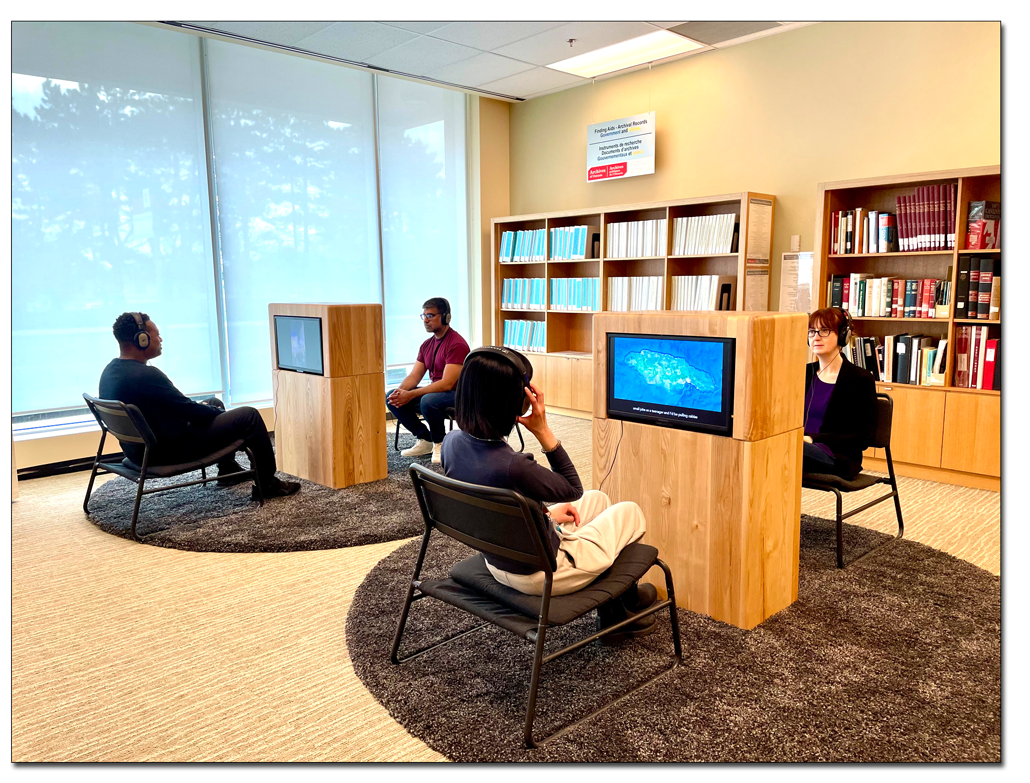Black Diasporas Tkaronto-Toronto
The Archives of Ontario is thrilled to feature Black Diasporas Tkaronto-Toronto, a community-made oral narrative exhibition project that documents spaces, places and experiences that have meaning to Black people and communities in Tkaronto-Toronto. The project manifests as a travelling exhibition, now on display in the Archives’ Reading Room, and as a digital map that serves as an archives for 10 commissioned short films and 500+ oral narrative stories made by 150+ Black Torontonians.
Location: Archives of Ontario's Reading Room at 134 Ian Macdonald Blvd., Toronto, ON M7A 2C5
Dates: April 24, 2025 to February 27, 2026
Visiting hours: Monday-Friday, 8:30 am to 5:00 pm

Click to see a larger image
Black Diasporas Tkaronto-Toronto exhibit in the Archives of Ontario’s reading room
Black Diasporas Tkaronto-Toronto celebrates the spectrum of Black life and Black people in this city, defined in the project as people of African ancestry who have been brought by force or made their way by choice to Canada since the colonization of the Americas.
Referencing and honouring traditional African oral narrative, Black Diasporas is a multifaceted, immersive, and interactive exhibit that serves as a digital and physical archive. The project provides the opportunity for more inclusive and nuanced community-led narratives that exemplify the diversity of the experiences of the 265,000+ people from the African diaspora living in Tkaronto-Toronto. Black Diasporas shares life stories that encapsulate a variety of experiences, from the joys of family life and playing as a child, to the history of little Jamaica on Eglinton and the mundaneness of catching a streetcar or bus, to the tragedy of the effects of racial stereotyping and the loss of life. The main aim of this project is to create space for community-led dialogue. No project could entirely encapsulate the diversity of character, experience and community; however, we must begin asking questions and providing a platform to hear directly from the Black diasporas of Tkaronto-Toronto.
The Black Diasporas project is presented and facilitated by the Museum of Toronto and afrOURban (501c3) with the support of Charles Street Video, BAIDA, It's OK and the Social Innovation Change Initiative at the Harvard Kennedy School.
Storytellers:
Abi, Adeyemi, Ahmed, Alvin, Amelia, Amina, Anna, Anton, Audrey, Chris, Christine, Clement, Cliff, Courage, Eli, Erica, Gary, Georgina, Ian, Ian, Isingoma, Jahnelle, Jay, Julien, Kathy, Kwame, Michelle, Monique, Mqedani, Nala, Nuradin, Ohemaa, Omo, Patrina, Queen, Raquel, Rok, Rosemary, Sale, Sam, Samantha, Sandra, Sasha, Shirley, Sydney, Telma, Troy, Ubah, Vivienne, Zahra
Interviewers:
Abdoulaye, Abigail, Alex, Alexander, Ana, Bianca, Che, Christian, Clara, Claudine, Cliff, Daysha, Ebube, Grace-Camille, Haiat, Ian, James, Komi, Kwesi, Lindile, Lydia, Mahlikah, Marcel, Michelle, Nicholas, Nicole, Otto, Paa-Kwasi, Pulga, Ravyn, Sara, Sasha, Shemar, Tafadzwa, Tanaka, Tina, Tiyahna, Tura, Yamari, Zanira
Editors:
Mufaro Mukoki, Sydne, Barnes-Wright, Shani McKenzie, Tafyra Poyser, Temi Gina, Yasmin, Evering-Kerr
Film Directors:
Aisha Fairclough, Ayo Tsalithaba, Cazhhmere Downey, Chelsea Nyomi, Isabel Okoro, Nala Haileselassie, Raoul Olou, Roya DelSol, William Selviz, Yazid Mohamednur
Project Advisory:
Farida Abu-Bakare, Joseph Mpalirwa, Sandra Githinji, Tura Cousins Wilson
Project Film Team:
Joseph Mpalirwa, Davin Henson
Museum of Toronto team:
April Hazan, Bria Dietrich, Davin Henson, Heidi Reitmaier, Julie Suh, Rachel Hilton, Sarah Tumaliuan, Nadine Villasin Feldman
AfrOURban team:
Kholisile Dhliwayo, Monica Nawanga, Phillip Johnson, Sandra Githinji, Tarirai Chivore



